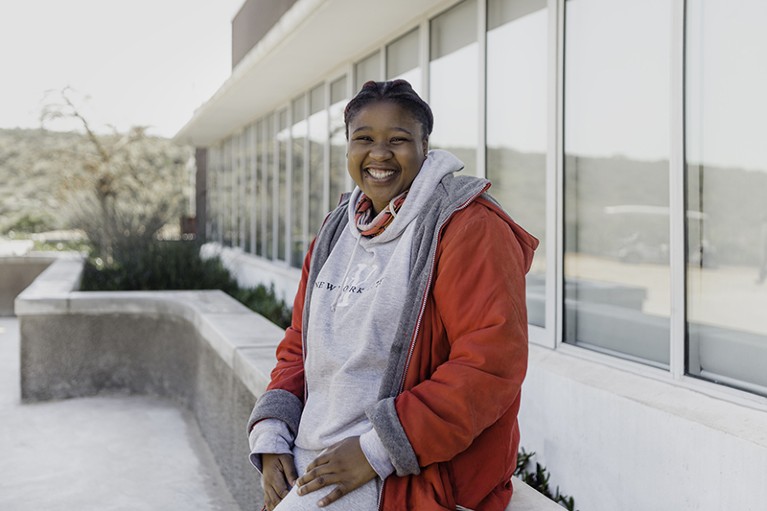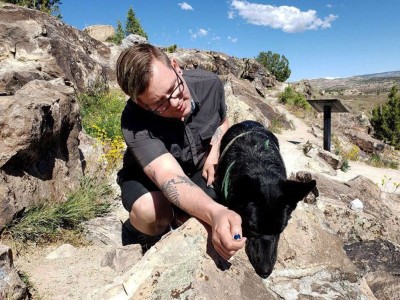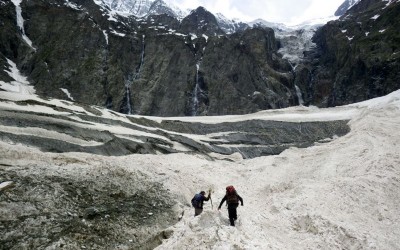
Nomawethu Hlazo’s experiences with race and gender have shaped her perceptions of archaeology.Credit: Robyn Walker
In August, archaeologist Nomawethu Hlazo participated in field trip to support female scientists, particularly women of colour, who do fieldwork for the University of Cape Town (UCT) in South Africa. “Harassment and inappropriate conduct are a reality in the field. Through these camps, we hope to inform codes of conduct that improve equality and safety,” says UCT deputy dean of transformation in the science faculty Rebecca Ackermann, who is Hlazo’s mentor and PhD supervisor.
The camp was the first such event at the university to involve not just female students, but also an all-women cast of trainers and mentors. The 20-odd participants, who worked or studied in the departments of archaeology and geology, spent three days in the West Coast Fossil Park. The park is 150 kilometres north of Cape Town, and its famous finds include short-necked giraffes and African bears. In between rock-knapping workshops (in which participants learnt to make tools out of flint) and a geological survey, they participated in a 3.5-hour workshop on sexual harassment, which will feed into the UCT science faculty’s new code of conduct.
Hlazo says it was the best field-based experience she has ever had: “The girls were lovely, united, supportive of each other.”
What was it like being a female, black student in archaeology?
I felt really isolated. There aren’t a lot of black women, or people of colour in general, in archaeology. I felt that people were wondering what I was doing there and also that I had to work ten times harder to prove that I was smart enough to be there. In my first field school, when I was a third-year undergraduate, one other female archaeologist and I were the only black people among 30–40 white individuals. Generally, during field trips, people seemed to act surprised when I knew what to do. I had camped with my family, so I knew how to stay hydrated and what to do when I needed the bathroom. But my peers would say things such as, “Oh, I didn’t expect you to know that.” I didn’t know whom to turn to with my problems. Mostly, I was silent about how I felt.
What made you stay in the subject?
My mentor, Rebecca Ackermann, a biological anthropologist who taught human evolution. I took her course as part of my undergraduate degree in archaeology. She is very involved in efforts to combat racism and sexism in the palaeosciences, and it was enlightening to see someone so comfortable with herself: a woman who was able to dismiss what others were saying about her. She became one of my PhD supervisors.
What is your PhD research?
I study Paranthropus, an extinct hominin whose fossils have been discovered in east and southern Africa. I’m considering the different evolutionary pressures that resulted in the great diversity between and within hominin species. It’s typically thought that hominin species diverged, a bit like branches on a tree, and that this process was driven by natural selection. This narrative is based on competition — the survival of the fittest. But there are other interpretations of human evolution that don’t focus so hard on competition. I’m exploring how things such as genetic drift — in which the emphasis is on chance rather than competition — resulted in an evolutionary journey that looks different from the standard model, like a braid in which the species split and converge. I want to link that to the diversity of humans that we see today.
How does being the person you are impact the work that you do?
The typical narrative about human origins was created by a very homogeneous group of scientists, and I think one of the reasons that diversity in science is so important is that it allows us to challenge old narratives. I think that telling that story as an African woman can help to challenge the white, male-dominated narrative of the past. The cradle of humankind is in South Africa — there are so many fossils there. So why not be in this place as a black woman — an African woman — telling our story about our heritage?
Does the pressure on you to be a role model ever feel like a burden?
It was a lot at first, especially because I’m an introvert. I’ve always wanted to change the world, but I thought I’d quietly do it in the lab. But then I realized: that’s not how the world works. People need to know who you are, and they need to see you. If I don’t voice my opinions and speak out, then nothing is ever going to change.
Do you plan to stay in academia after your PhD?
That’s going to be a no. I find the environment so toxic. You are also expected to work extremely long days, and if you don’t, you feel like a failure. I’d like a normal life. I don’t want to feel that if I’m not putting in 25-hour days, then I’m not working hard enough. So I’ll go into industry, heritage work with museums or archaeological sites, or science communication. Or I will be a scientist affiliated with a non-academic institution and collaborate with academics. I’ll never wholly leave research, because it’s who I am.



 Racism rife at top South African university, says report
Racism rife at top South African university, says report
 Lab heads should learn to talk about racism
Lab heads should learn to talk about racism
 Meet the African researcher who is building a core of junior immunologists on the continent
Meet the African researcher who is building a core of junior immunologists on the continent








